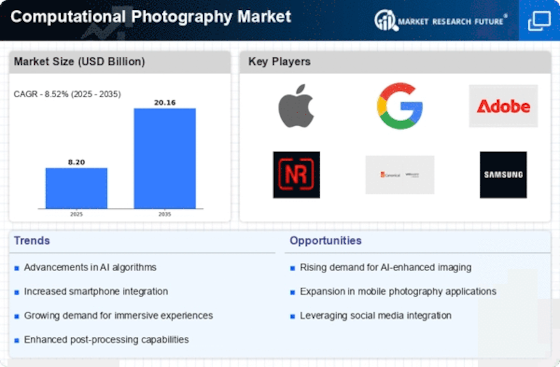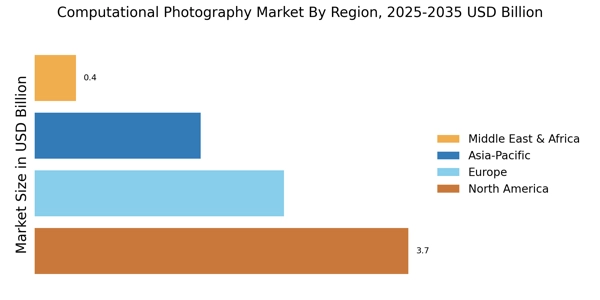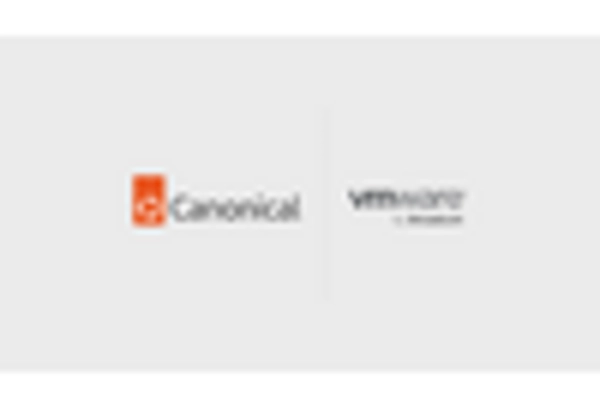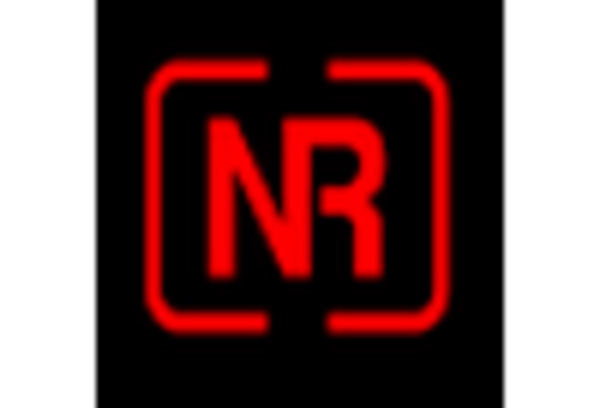Advancements in AI Algorithms
The Computational Photography Market is experiencing a surge in advancements in artificial intelligence algorithms. These innovations enhance image processing capabilities, enabling features such as automatic scene recognition, improved low-light performance, and real-time image enhancement. As AI continues to evolve, it is projected that the market will witness a compound annual growth rate of approximately 20% over the next five years. This growth is driven by the increasing demand for high-quality images in various sectors, including social media, e-commerce, and digital marketing. The integration of AI not only streamlines the photography process but also empowers users to achieve professional-grade results with minimal effort. Consequently, the proliferation of AI-driven applications is likely to redefine user expectations and expand the overall market landscape.
Emergence of Social Media Influencers
The rise of social media influencers is significantly shaping the Computational Photography Market. Influencers rely heavily on high-quality visual content to engage their followers and promote products, creating a substantial demand for advanced photography techniques. This phenomenon has led to an increase in the use of computational photography tools, as influencers seek to differentiate their content in a saturated market. The influencer marketing industry is projected to reach 15 billion dollars by 2022, indicating a robust growth trajectory that directly correlates with the demand for superior visual content. As influencers continue to leverage computational photography to enhance their online presence, the market is likely to witness further innovations and developments in imaging technologies. This trend underscores the importance of computational photography in modern marketing strategies and consumer engagement.
Adoption of Augmented Reality in Photography
The adoption of augmented reality (AR) technologies in photography is emerging as a transformative driver for the Computational Photography Market. AR applications enable users to overlay digital elements onto real-world images, creating immersive experiences that enhance storytelling and engagement. This trend is particularly evident in sectors such as real estate, retail, and entertainment, where AR is utilized to provide interactive visual content. The AR market is expected to grow at a compound annual growth rate of over 30% in the coming years, indicating a strong potential for integration with computational photography techniques. As more businesses recognize the value of AR in enhancing customer experiences, the demand for computational photography solutions that support these technologies is likely to increase. This convergence of AR and computational photography could redefine how visual content is created and consumed.
Growing Demand for High-Quality Visual Content
In the current digital age, the demand for high-quality visual content is escalating, significantly impacting the Computational Photography Market. Businesses across various sectors, including advertising, entertainment, and education, are increasingly relying on visually appealing content to engage audiences. This trend is reflected in the rising investments in photography and videography, with the market projected to reach a valuation of over 100 billion dollars by 2026. As consumers become more discerning about visual quality, the need for advanced computational photography techniques becomes paramount. This demand is further fueled by the rise of social media platforms, where high-resolution images and videos are essential for brand visibility and consumer engagement. Thus, the growing emphasis on visual storytelling is likely to drive innovation and investment in computational photography technologies.
Integration of Computational Photography in Smartphones
The integration of computational photography technologies in smartphones is a pivotal driver for the Computational Photography Market. As smartphone manufacturers increasingly incorporate advanced imaging features, such as multi-frame processing and depth mapping, the capabilities of mobile devices are rapidly approaching those of professional cameras. This trend is evidenced by the fact that over 80% of consumers now use their smartphones as their primary photography tool. The competitive landscape among smartphone brands has led to continuous enhancements in camera systems, resulting in a projected market growth of around 15% annually. This integration not only caters to the growing consumer preference for mobile photography but also encourages the development of innovative applications that leverage computational techniques. Consequently, the smartphone segment is likely to remain a dominant force within the computational photography market.
















